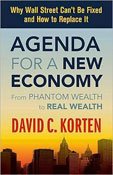Knowledge truly is power.
Regarding the economy, the Internet is flooded with opinions about what to do and why "their" plan is inferior to "our" plan. The problem with most of those plans is that they rarely do more than tinker around the edges of the problem. Almost every economic expert provides ways to fix the legislation and institutions that have gotten us here, but there is a lack of genuinely new ideas: most just rehash economic theories of the past.
David C. Korten's "Agenda for a New Economy" (Barrett-Kohler Publishers, 2008, $14.95) is a departure from the formulaic responses of politicians and economists, who, let's face it, have a good bit of skin in the game. Maintaining the economic status quoeven when it isn't workingis in their best interest even if it's not in the best interest of the people or the environment.
The book's subtitle gives away Korten's goal: "Why Wall Street Can't Be Fixed and How to Replace It." If that makes you uncomfortable, it should. Americans have long held Wall Street sacred, believing that without it, economic life itself would be impossible. But would it? And if Wall Street going wild is the cause of the current problems, why are we paying them to fix themselves instead of coming up with a better solution?
Korten, with a master's degree and PhD from Stanford University and teaching experience at Harvard University, explores these questions in his book, dismantling some of our closest-held beliefs about how the American economy works. Along the way, he skewers more than a few sacred cows, including our definition of wealth and the real role Wall Street plays in society.
Real wealth, Korten says, is "beyond price and unavailable for market purchase." In his definition, he includes healthy children, good relationships, caring communities, a clean environment and "the many things of intrinsic artistic, spiritual, or utilitarian value essential to maintaining the various forms of living wealth" that "may or may not have a market price." It's a perspective Korten learned in the field as he searched for ways to eliminate poverty.
Conversely, the "phantom wealth" created by Wall Street "appears or disappears as if by magic." Korten makes a good argument that our leaders have sold the public a bill of goods. Wall Street's wealth "generally denotes money created by accounting entries or the inflation of asset bubbles unrelated to the creation of anything of real value or utility," he writes. The Federal Reserve is implicit in the deception, Korten adds, aligning policies to give priority to Wall Street over the U.S. industrial sector, which outsourced their jobs to increase stock prices.
The book also puts Wall Street into historic perspective. Traders and speculators are a natural outgrowth of monarchy's privateers, Korten says, a modern-day equivalent of pirate mercenaries hired by kings and queens and allowed to plunder with impunity for a share of the gains. In the 5,000-year-old game of domination, Wall Street exists to ensure that those with money will make more of it. Ultimately, it's a game of keeping money in private hands, and the price is high, dividing the world "between the profligate and the desperate," with an unreal expectation of perpetual economic growth on a finite planet.
It doesn't have to be this way, Korten says, and this precise moment in history presents an unprecedented opportunity to begin a new economic story, using the Internet as the medium for a new message.
The world's 1.5 billion Internet users "are learning to function as a dynamic, self-directing social organism that transcends boundaries of race, class, religion, and nationality to serve as a collective political conscience of the species." Those boundaries originate, in Korten's perspective, "in institutions that grant unaccountable power and privilege to the few and assign the majority to lives of hardship and desperation."
"Agenda for a New Economy" pulls no punches in spelling out how we got into the global economic mess that faces every American citizen today. For some, it may inspire fear, disbelief and even anger. But stick with it: Even if some of it sounds untenable, what it doesn't do is tinker around the edges.
Korten's 12-point agenda is a radical departure from our current economic paradigm. From realigning economic policy to recovering Wall Street's unearned profits, Korten spells out his vision of a new way of making the world work for everyone. Local self-reliance is a big part of it, as is equitable distribution of wealth and income.
Clearly, there's only so much common sense that one can absorb before cynicism takes over. But Korten recognizes this, too.
"Some may feel that what I am suggesting here goes too far and will ruin the party," he writes. "Given our situation, my fear is it may not go far enough. The party is over, irrespective of what we do. We have only begun to experience the consequences. We have the power to turn this world around for the sake of ourselves and our children."
Author David C. Korten is founder of the Positive Futures Network, publisher of Yes! magazine (http://www.yesmagazine.org) and author of numerous books.


